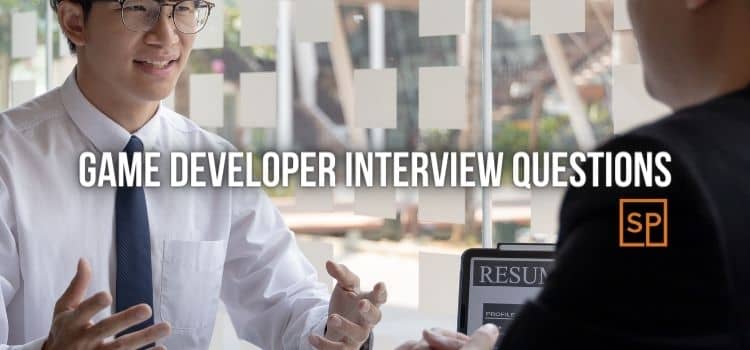As you're preparing your interview for a position in Game Development, get ready to be asked these questions. Study the underlying concepts of the technical questions.
For the behavioral part, you can write out and rehearse your answers beforehand – just to have something prepared in the back of your mind for when you're in the heat of the moment.
Good luck!

General Questions about Game Development
These are the low-difficulty questions you'll get asked mostly during the phone screen and at the start of your in-person interview.
1. Tell me about your personal projects.
2. On a scale of 1-10, how good are you at C++?
3. Tell me about your experience/expertise with Unreal Engine.
4. How do game UI frameworks work exactly?
5. What is Qt?
6. What is WPF?
Specific Game Development Interview Questions
While many questions in game interviews overlap with general programming interview questions, there's also many that are specific to this industry. Because game dev companies are dealing with a lot of unique problems, they want to make sure you have the right kind of expertise needed for solving these.
7. How do you implement a system where stats change constantly, like in a role-playing game?
8. How would you create an algorithm for the spread of a virus among game characters?
Technical Questions
9. What is the Big O runtime of a list/array/set/map/hashmap/vector?
10. How to do Binary Search?
11. When do you best use a list/array/set/map/hashmap/vector?
12. How does a hashmap work in detail?
13. What is the runtime for binary searching an array?
14. What are balanced vs unbalanced trees and when to use each?
15. How do you do depth-first & breadth-first searches, using stack/queue?
16. What's the difference between a reference and a pointer?
17. What does dot product represent? What does its magnitude mean?
18. How can dot product be used?
19. What does cross product represent? What does its magnitude mean?
20. How can cross product be used?
21. How do you reverse a string?
22. What is reflection and how does it work?
23. How do you reflect a vector against a wall?
24. How does the vtable work?
25. How do you determine when a moving object is nearest to another object?
26. When do you need to normalize a vector?
27. How do you calculate a normal?
28. How do you calculate the distance between two vectors?
29. How do you set a bit?
30. How do you clear a bit?
31. How do you check a bit?
32. How do you toggle a bit?
33. What is the maximum value for an int32?
34. Please write -3 in binary.
35. Please write -4 in hex.
36. How large is an int* on a 64-bit system?
37. Explain a Slab allocator.
38. Explain a Buddy allocator.
39. Explain a Stack allocator.
40. Explain a Relocatable Heap.
41. Explain a Pooled Allocator.
Game Debugging Questions
42. How would you go about trying to reproduce an error?
43. What options does a debugger give you for solving a specific problem?
Optimization
44. How do you make a function run on thousands of objects at as high a framerate as possible?
45. How do you allocate memory such that CPU cache size is used most effectively?
46. Do you have experience with tools like VTune, and how would you use them?
Behavioral Interview Questions for Game Developers
Also called “cultural fit”-questions, they are meant to screen you for how compatible you'll be with the company and your coworkers, as well as attributes like being disciplined and a good problem-solver.
You'll be asked about your time working at other companies, to see how you've dealt with different situations and challenges.
